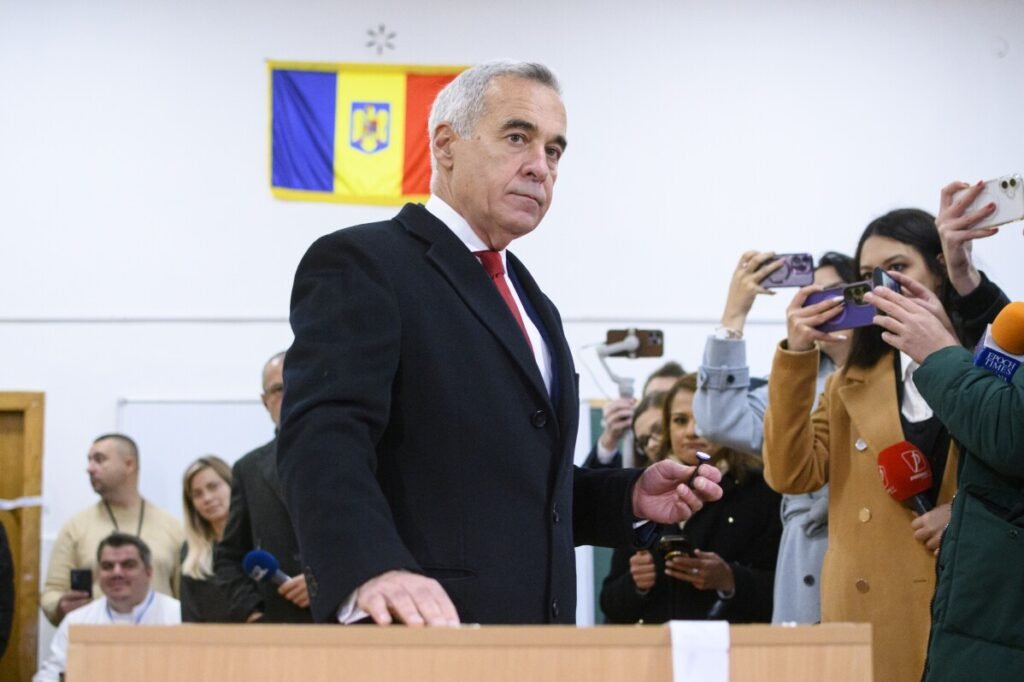Romania’s Far-Right Surge: The Illusion of Post-Politics and the Collapse of Democratic Consensus
Over the past decade, a narrative has taken hold across the West: that political divisions are no longer shaped by the traditional left–right spectrum, but rather by cultural binaries such as “open” versus “closed” societies. According to this view, politics has become a matter of values and identity, not class or economics. This notion — a hallmark of the so-called post-political era — has allowed ruling elites to obscure the centrality of material interests and deny the legitimacy of any systemic alternative.
In practice, “post-ideological” politics translates into a spectrum where all choices veer to the right. The “extreme center” thrives by positioning itself above politics while serving capital. In a world still structured by inequality and scarcity, this erasure of ideological debate works only to entrench neoliberalism as the unchallenged order.
While some countries like France and Spain have seen new left-wing movements break through the post-political fog, others have been less fortunate. Romania, in particular, has witnessed the erasure of left economic discourse and the dominance of a narrow spectrum ranging from pro-business liberalism to far-right nationalism. Politics has been reduced to a spectacle of cultural posturing, devoid of class content, as the economic consensus remains untouched.

Manufactured Consensus and the Rise of Călin Georgescu
In November 2024, Romania’s presidential elections delivered a political earthquake. Independent candidate Călin Georgescu — a previously unknown figure — topped the first round of voting. Despite lacking an official campaign apparatus, Georgescu surged to prominence through a sophisticated and heavily funded social media operation, particularly on TikTok, where algorithmic manipulation allowed his messaging to reach millions unnoticed by the traditional media or state institutions.
The Constitutional Court annulled the vote, citing suspected foreign interference — specifically from Russia — in support of Georgescu. While evidence of algorithmic manipulation and undeclared campaign financing was compelling, the intelligence reports released afterward offered little substantive proof of direct Russian collaboration.

More revealing were later findings that Romania’s two largest political parties had quietly backed Georgescu, hoping he would siphon votes from rivals. His rise was less a grassroots revolt than a coordinated political gamble, the full extent of which remains hidden.But Georgescu’s appeal also stemmed from his rhetoric. Many voters gravitated to his platform not only for its nationalism and religious conservatism, but because he dared to speak about inequality, exploitation, and national sovereignty in economic terms. He called for the nationalisation of land, the redistribution of resources, and the restriction of corporate power. While couched in reactionary and nativist language, these positions tapped into deep-seated discontent.Georgescu did not represent a left-populist revival. Like many historical fascists, his critique of capitalism was filtered through a nationalist and petty-bourgeois lens.
He promised lower taxes, opposed public welfare, and denounced “nanny-state” socialism, while blaming economic woes on foreign interests rather than structural class inequality. His so-called revolution turned out to be carefully aligned with the political establishment: he surrounded himself with ex-generals and intelligence officers, pledged loyalty to Donald Trump, and courted both domestic elites and American influence.
The Aftermath: Establishment Response and Far-Right Consolidation
Though Georgescu was disqualified from the election rerun, the aftershocks of his campaign continue to shape Romanian politics. His rhetoric, aesthetic, and policy agenda have been absorbed — if not outright copied — by much of the political mainstream. In an effort to win over disaffected voters, centrist parties have embraced reactionary themes, dragging the Overton window further to the right.
Mainstream candidates now invoke “traditional values,” promote anti-LGBTQ+ messaging, and borrow Georgescu’s anti-drug, anti-immigration postures. Some, like ruling coalition candidate Crin Antonescu, even made fascistic outbursts — publicly suggesting drug dealers be executed en masse — only to later walk back the comments. Rather than repelling extremism, these gestures have emboldened it.
This convergence of centrism and reaction reflects a broader European pattern: when liberals adopt the language of the far right, they legitimise and strengthen it. As in France, where Macron attempted to neutralise Marine Le Pen by mimicking her positions, Romania’s establishment is normalising the very forces it claims to oppose.
The Illusion of Political Choice
While candidates may differ on cultural issues or personal style, they are united on core economic policies. Romania’s budget deficit remains high, yet no major figure proposes taxing wealth or capital. The shared consensus is one of austerity: shrink the public sector, improve tax collection (without reform), and continue favouring low-tax regimes that benefit the rich. The state, we are told, must be small, taxes are already “too high,” and entrepreneurs are national heroes — despite Romania’s corporate tax rates being among the lowest in Europe.
Thus, the voter is offered a hollow choice. No matter which candidate wins, austerity remains. The influence of the secret services remains unchallenged. The “system” — so often invoked in populist slogans — is never truly defined, let alone threatened.
The Far Right’s Realignment
In the vacuum left by the discredited establishment and the absent left, new far-right actors continue to radicalise the discourse. George Simion, head of the far-right AUR party, has declared himself Georgescu’s political heir. His strategy oscillates between softening rhetoric to gain mainstream legitimacy and ramping up inflammatory statements to appeal to Georgescu’s radical base. While Simion claims to oppose the system, his real aim is to inherit it — preferably intact.
Even those voters who supported Georgescu are divided. Some reject Simion as too soft or too compromised, illustrating how far the political centre of gravity has shifted. Simion’s calls for violent retribution against state officials who barred Georgescu from running only highlight the volatility of Romania’s far-right landscape.

On foreign policy, all candidates — regardless of ideology — pledge allegiance to the United States. Even nationalist candidates avoid criticising American foreign policy. While centrists support stronger ties with the EU, far-right candidates, paradoxically, are even more sycophantic toward Washington. Their only divergence lies in hostility toward Ukraine and ambiguous views on Russia.
A Democracy Hollowed Out
Though Georgescu lost, his ideology has triumphed. The major parties now compete on his terms. Some, like Macron in France, believe adopting the far-right’s posture can contain its rise. Instead, this approach emboldens reactionaries, demoralises the left, and deepens cynicism.
Even well-meaning reformist candidates have failed to propose structural alternatives. Their critiques focus on individual corruption rather than systemic injustice. For them, the solution to social crisis lies in better managers, not democratic transformation. They accept the neoliberal economic order as immovable — thus offering nothing meaningful to those suffering under it.
We remain trapped in the “end of history” mindset — that all economic problems are settled, and politics is now merely about administering the consensus. But this consensus is rotting from within. And as economic hardship intensifies, fascism finds fertile ground.
Reclaiming Politics from Post-Politics
The so-called post-political era is not the absence of politics — it is the dominance of a single political ideology masquerading as neutrality. Behind the illusion of consensus lies the brutal truth of class power: as long as ruling elites hold the reins, they will prefer fascism over any threat to their wealth.
If we are to resist this descent into authoritarianism, we must first reclaim politics as a space for real ideological struggle. We must bring class, labour, and material justice back into the centre of public debate.
The fight for democracy — and for a livable, just future — demands nothing less.


